-
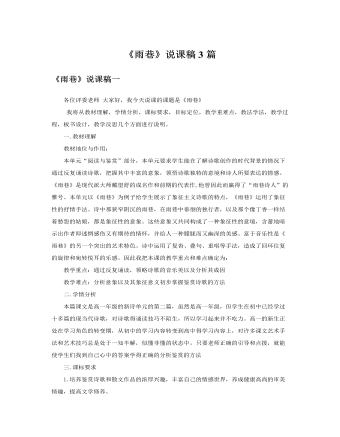
人教版高中语文必修1《雨巷》说课稿3篇
一.教材理解教材地位与作用:本单元“阅读与鉴赏”部分,本单元要求学生能在了解诗歌创作的时代背景的情况下通过反复诵读诗歌,把握其中丰富的意象,领悟诗歌独特的意境和诗人所要表达的情感。《雨巷》是现代派大师戴望舒的成名作和前期的代表作,他曾因此而赢得了“雨巷诗人”的雅号。本单元以《雨巷》为例子给学生展示了象征主义诗歌的特点,《雨巷》运用了象征性的抒情手法。诗中那狭窄阴沉的雨巷,在雨巷中徘徊的独行者,以及那个像丁香一样结着愁怨的姑娘,都是象征性的意象。这些意象又共同构成了一种象征性的意境,含蓄地暗示出作者即迷惘感伤又有期待的情怀,并给人一种朦胧而又幽深的美感。富于音乐性是《雨巷》的另一个突出的艺术特色。诗中运用了复沓、叠句、重唱等手法,造成了回环往复的旋律和宛转悦耳的乐感。因此我把本课的教学重点和难点确定为:教学重点:通过反复诵读,领略诗歌的音乐美以及分析其成因教学难点:分析意象以及其象征意义初步掌握鉴赏诗歌的方法
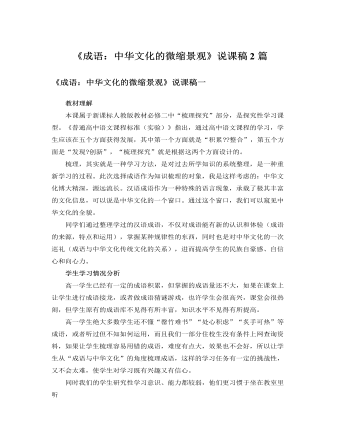
人教版高中语文必修2《赤壁赋》说课稿3篇
[教学反思]人教版高中语文必修二第三单元安排了《兰亭集序》《赤壁赋》《游褒禅山记》三篇古代山水游记散文,它们借游赏之事,探索生命的意义、治学的道理。师者,所以传道、授业、解惑也。高中的教材选用的都是历史经典名篇,每一篇都闪烁着儒道释等百家光辉的思想。编者要老师传道的意图很明显。即非如此,看着这些影响历代、影响世界的如日月之耀眼光华的伟大思想就躺在我们的教科书里,又如何能不讲呢?所以,我将本课的教学重难点拟定为:帮助学生建立积极的生死观,掌握多角度看问题的正确的思想方法。当然,也让学生领会了融写景、抒情、说理于一炉的大家手法。整堂课各教学环节,环环相扣,过渡自然,读、思、议、写训练到位,而且全部围绕“生死观”展开,如一篇形散神不散的散文。
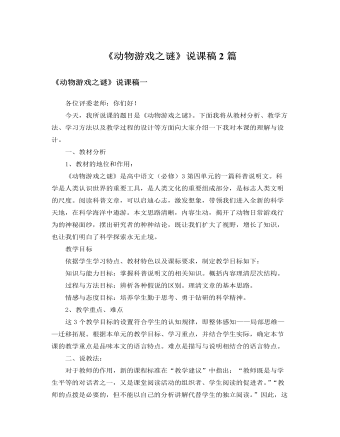
人教版高中语文必修3《动物游戏之谜》说课稿2篇
一、导入新课人类社会越来越现代化,新科学技术日新月异,令人目不暇接,称之到了“知识爆炸”的时代也毫不为过。由此而来的是生活的快节奏,学习和工作的竞争也越来越激烈。这种竞争一直波及到了儿童,加之中国几千年来形成的望子成龙的传统观念,使作父母的把一切希望都寄托在孩子身上,实现自己未能实现的理想。祖孙三代4、2、1的局面,使12只眼睛都盯在了孩子身上,真是走路怕摔着,吃饭怕噎着,干活怕累着,要星星不敢摘月亮,要吃什么跑遍全城也要买来。这种过分保护、溺爱及过早地灌输知识会得到什么结果呢?乐观者说孩子越来越聪明,越来越早熟,将来能更好适应现代化的要求;悲观者则认为豆芽菜式的孩子将来经不起风浪,小皇帝太多了很难凝聚成统一力量,将来谁去当兵,谁去干那些艰苦创业性工作……。对孩子本身来说,是幸福还是……在此不想多发议论,还是让我们来看看动物世界的孩子们吧,也许会得到某种启迪。
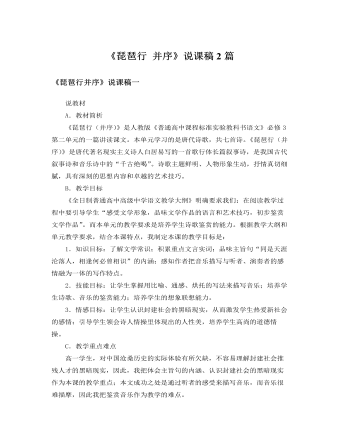
人教版高中语文必修3《琵琶行 并序》说课稿2篇
说教材A.教材简析《琵琶行(并序)》是人教版《普通高中课程标准实验教科书语文》必修3第二单元的一篇讲读课文。本单元学习的是唐代诗歌,共七首诗。《琵琶行(并序)》是唐代著名现实主义诗人白居易写的一首歌行体长篇叙事诗,是我国古代叙事诗和音乐诗中的“千古绝喝”。诗歌主题鲜明、人物形象生动,抒情真切细腻,具有深刻的思想内容和卓越的艺术技巧。B.教学目标《全日制普通高中高级中学语文教学大纲》明确要求我们:在阅读教学过程中要引导学生“感受文学形象,品味文学作品的语言和艺术技巧,初步鉴赏文学作品”。而本单元的教学要求是培养学生诗歌鉴赏的能力。根据教学大纲和单元教学要求,结合本课特点,我制定本课的教学目标是:1.知识目标:了解文学常识;积累重点文言实词;品味主旨句“同是天涯沦落人,相逢何必曾相识”的内涵;感知作者把音乐描写与听者、演奏者的感情融为一体的写作特点。
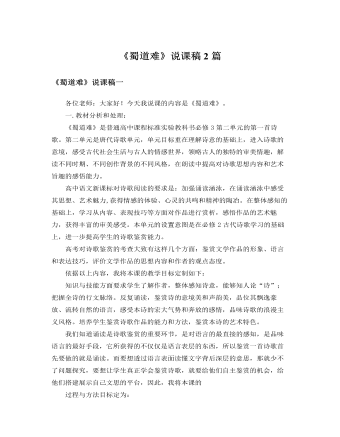
人教版高中语文必修3《蜀道难》说课稿2篇
(1)“问君西游何时还……使人听此凋朱颜。”诗题下未注明送何人入蜀,所以这里的“问君”无妨假定实有其人,可以读得亲切一些。将行而问“何时还”,已有不可行之意,重音要落在“不可攀”三字上,当用劝说的语气读。以下四句借鸟声渲染旅途中悲凉凄清的氛围,读时要放低声调,有干里孤身之感,至“愁空山”徐徐而上。然后用感喟的语调读主旨句,至“凋朱颜”略作一顿,以示意犹未尽。(2)“连峰去天不盈尺……胡为乎来哉!”仍是说不可行,但内容加深了一层,因为说的是蜀道的险恶。前四句不是纯客观的描写,读时须设想这是旅游者攀援于“连峰”“绝壁”之上置身于“飞湍瀑流”之间,要使听者感到惊心动魄。读后可作稍长停顿,再用“其险也如此”缓缓收住。末句是诗人借用蜀人的口气,对历险而来的游者深表叹息——“胡为乎来哉”不是询问,当用降调读,暗含“何苦而来”之意。

新人教版高中英语必修1Unit 2 Travelling Around-Listening and Speaking & Listening and Talking教案
【教学目标与核心素养】1. Instruct students to get main facts by listening and motivate them to talk about the topics about how to prepare for the trip and make reservations by listening and ultimately can make travel arrangements and reservations. 2. Develop students’ sense of cooperative learning and individual thinking capability. 3. Develop students’ different listening skills to solve different listening comprehensive problems.4. Help students to understand how to use the structures “the present continuous tense (be doing) is used to express future plans.【教学重难点】1. Teach students how to focus on key words, not on single words or grammar.2. Prompt Ss to talk about the related topics, such as how to prepare for the trip and make a travel plan.【教学过程】Step 1: Listening and SpeakingLead inThe teacher is advised to talk with their students about the places that they want to travel most both at home and abroad: boys and girls, if you have a chance to travel around the world, where will you go? After their small talk, the teacher can move on by finishing the following listening task:Before travelling, what do we need to prepare for the trip?
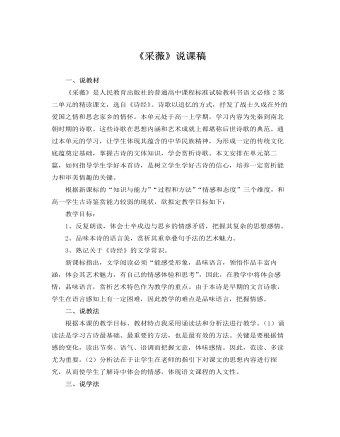
人教版高中语文必修2《采薇》说课稿
三、疏通课文,体会情感学生朗读一至三节,找出通假字,如“莫”;语助词如“止”“曰”;古今异义词如“启”“居”。以及个别短语如“靡室靡家”“载饥载渴”的结构,结合上《卫风·氓》中出现的相同或类似的结构来理解。检查学生的自学情况,抽查翻译,纠正错误。这三节都以采薇起笔,让学生思考课文呢写了薇菜生长的哪几种形态,有什么作用?学生思考。这个问题不难,但学生回答可能不完整,只点到用于表达士卒思归之情的强烈。老师要补充,用薇菜的生长来反映归期的推移和不定期,思念之情更加沉重。同时在艺术手法上,同《卫风·氓》用“桑叶”来起兴一样,这里也是比兴手法,引出下文。另外,战士们靠野菜来充饥也反映了战士们生活艰苦,兴中有赋。
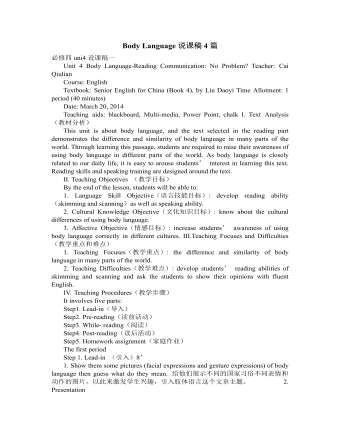
人教版高中英语必修4Body Language说课稿4篇
Textbook: Senior English for China (Book 4), by Liu Daoyi Time Allotment: 1 period (40 minutes)Date: March 20, 2014Teaching aids: blackboard, Multi-media, Power Point, chalk I. Text Analysis (教材分析)This unit is about body language, and the text selected in the reading part demonstrates the difference and similarity of body language in many parts of the world. Through learning this passage, students are required to raise their awareness of using body language in different parts of the world. As body language is closely related to our daily life, it is easy to arouse students’ interest in learning this text. Reading skills and speaking training are designed around the text.II. Teaching Objectives (教学目标)By the end of the lesson, students will be able to:1. Language Skill Objective(语言技能目标): develop reading ability (skimming and scanning)as well as speaking ability.2. Cultural Knowledge Objective(文化知识目标): know about the cultural differences of using body language.3. Affective Objective(情感目标): increase students’ awareness of using body language correctly in different cultures. III.Teaching Focuses and Difficulties(教学重点和难点)1. Teaching Focuses(教学重点): the difference and similarity of body language in many parts of the world.2. Teaching Difficulties(教学难点): develop students’ reading abilities of skimming and scanning and ask the students to show their opinions with fluent English.
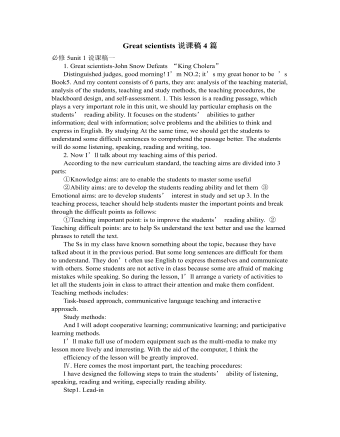
人教版高中英语必修5Great scientists说课稿4篇
通过写文章梗概,培养学生综合运用语言的能力,学习用恰当的英语描述科学家的故事。这是本课的教学难点。教师可以使用完形填空的方式来帮助学生整理语篇,从而来降低难度。本课的教学重点的突破方法是:在阅读前,让学生初步了解得出科学观点所需要的基本程序,从而轻松而自然地导入文章的阅读;在阅读过程中,由易到难设计快速阅读和精读的问题,层层推进各种阅读活动,让学生对阅读内容从整体感知到细节理解,最后深层读懂整篇文章,同时加强阅读策略的指导,让每个学生都主动参与课堂教学活动,最终达到提高阅读能力的目的。Step 4 Post-readingGroup Activities四人小组共同合作,在老师的适当指导下,就以下2个问题展开讨论,让学生就所知、所学、所感和所想融入话题,然后抽若干同学代表作小组发言。1. What do you think about John Snow, and what should we learn from him?2. Cholera was 19th century disease, which two diseases are similar to cholera today? Why?
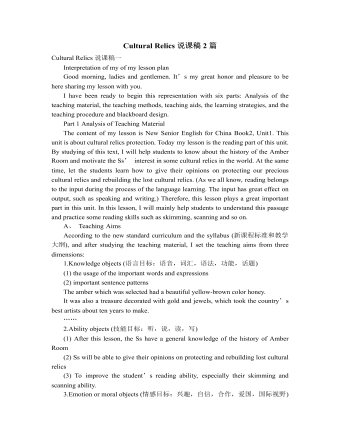
人教版高中英语必修2Cultural Relics说课稿2篇
Ⅲ. Analysis of the teaching material:The topic of this unit is cultural relics. Students are quite interested in topics about different cultures around the world. This is the second period of the whole unit. As a reading class, the passage mainly talks about the history of the amber room (how it was made, sent as a gift, lost and rebuilt).According to the new national curriculum, when teaching reading, much emphasis should be put on training the students’ reading skills.Ⅳ. Teaching objectives1. Language objectives:1) Students are required to master the key words and phrases occurred in the passage (e.g. amazing, decorate, belong, in return, less than etc.)2) Students are required to learn the attributive clause and acquire the sentence pattern.2. 1) Students are required to describe a certain thing by using the new sentence patterns.2) Students are required to master two kinds of reading skills—skimming and scanning, and learn to use them in their daily reading.3. 1) Students are required to know the history of the amber room.2) Students are required to appreciate cultural relics and understand the importance of protecting them.Ⅴ. Teaching important and difficult points1) the new words, phrases, and sentence pattern in the course of reading.2) Teaching difficult point: Help the students master two kinds of reading skills—skimmingand scanning and learn to apply them in daily use.Ⅵ. Teaching methods:Task-based method & Top-down model Ⅶ. Teaching aids: PPT, pictures, blackboard Ⅷ. Teaching procedure:
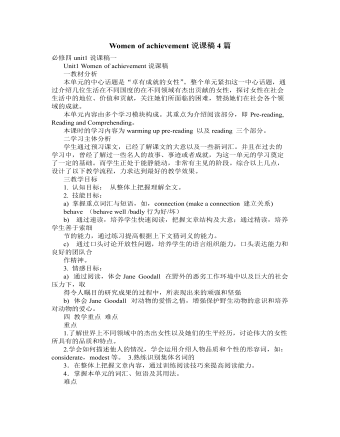
人教版高中英语必修4Women of achievement说课稿4篇
Good morning, distinguished judges:It’s my honor to talk about my teaching ideas with you. Today my topic is Women of Achievement. My presentation consists of six parts: the analysis of teaching material and student, teaching aims, key and difficult points, teaching and studying method, teaching procedures and blackboard design.First, let’s focus on the analysis of teaching material. This lesson is from New Senior English for China Student’s Book 4 Unit 1, the reading part. The main topic of the passage is the introduction of a student of Africanwildlife. After this lesson, the students will learn more information about her studying chimps in Africa, and their reading and speaking abilities can be developed as well.The next part is the analysis of students. My students are in senior high students. They have learnt English for many years, they’ve known many words and sentences, but their speaking and reading abilities are still not very good. So I will practice their speaking and reading abilities through different exercises.According to the New Standard Curriculum and the present situation, I set the teaching aims as follows: firstly, knowledge aims. Students can grasp some new words, such as worthwhile, move off. Moreover, students can understand the content of the passage and get familiar with the topic of studying chimps in wildlife. Secondly, ability aims. Students can use reading strategies such as skimming and scanning in reading process. Thirdly, emotional aims. Students can have the awareness of protecting animals and care about animals.Based on the above analysis, the key point of this lesson is to get the main idea and the detailed information from the passage; the difficult point is to talk about the wildlife protection and use reading strategies.
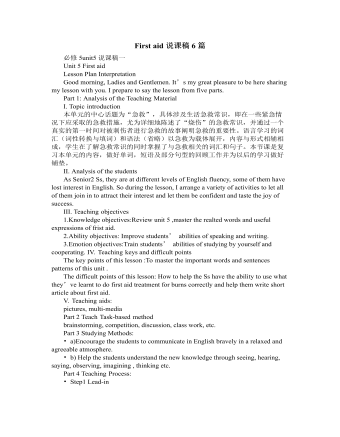
人教版高中英语必修5First aid说课稿6篇
In this class, I have 3 teaching aims, that is, knowledge aims, ability aims and emotion aims.1) Knowledge-Teach students new words and expressions, such as temporary, bleed,sprain choke, first aid, fall ill and so on.-Enable students to have a better understanding for some basic knowledge of first aid.2) Ability-Train students’ speaking, reading and writing abilities by different teaching activities, such as skimming, comprehending, team work, role play, retelling and writing.-Develop students’ reading strategy on how to move general idea to specific information.3) Emotion-Promote students’ awareness of giving first aid.- Cultivate students’ creativities.Then let’s come to my teaching methods and activities.III. Teaching methods and activities:To achieve different teaching aims, various kinds of teaching methods and activities will be adopted throughout this period, such as TBL (task-based learning), skimming, team work, brainstorm and others, which can offer students opportunities to fulfill tasks in which they can use language to achieve a specific outcome.IV. Teaching aids:Computer and blackboardV. Teaching important points:1) Make students have a clear mind for the structure of the text.2) Help students understand the theme of the text.VI. Teaching difficulties:1) So many new words may affect students’ understanding.2) How to get students to know about the functions of the skin and thecauses, characteristics and treatments for different degree burns,and the knowledge about giving first aid. VII. Blackboard design:
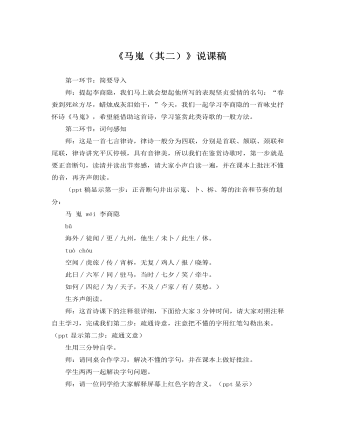
人教版高中语文必修3《马嵬(其二)》说课稿
生2:颔联的意思是只听到禁卫军中传来夜间巡逻的梆子声,不再向宫中那样安逸地听到有鸡人打鸣报时的声音了。生3:颈联的意思是说事变发生那天军队发生哗变停留不前,但当年唐玄宗以为自己可以和贵妃天天在一起,对天上的牵牛和织女一年一度的会见还加以嘲笑呢。生4:尾联的含义是为什么唐玄宗当了四十五年的皇帝,还不如普通百姓夫妻恩爱,长相厮守。师:好的。请大家再齐读一遍诗文,做到人人都能疏通诗的含义。学生再次齐读。第三环节:专项探究师:白居易曾说:“文章合为时而著,歌诗合为事而作。”这首诗就是作者途经马嵬驿,咏马嵬之变这一历史事件而作,所以我们鉴赏的第三步,就是通过标题和诗文,弄清诗中的历史事件。请同学们找出诗中哪些诗句描述了这一事件?
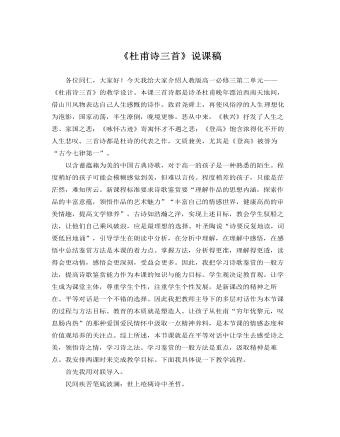
人教版高中语文必修3《杜甫诗三首》说课稿
我以以《登高》为例,引导学生进行意象分析,感悟意境美。古人云“立象以尽意”“古诗之妙,专求意象”意象是诗人情感的载体,是诗歌的灵魂。引导学生张开联想和想象的翅膀去感受,去体验是意象,诗歌鉴赏的关键。科林伍德说“真正艺术的作品,不是看见的,也不是听到的,而是想象中的某种东西。”诗人通过想象创造出诗的形象,我们读者通过想象丰富地再现诗人创造的形象。而感受体验则是以全部身心投入作品,心灵与心灵相沟通,感情与感情相交流,对诗人的想象活动进行再经历和再体验。因此,在引导意象解读中,我先让学生点击这一个,就是通过抓修饰词、依据感情基调、展开想象具体分析本诗中每个意象的情感意蕴和审美意蕴,使学生明白意象在每首诗中的独特性。

新人教版高中英语必修3Unit 5 The value of money-Reading and Thinking教学设计二
? Could you offer me some kind of work here?? I don’t want your charity, I just want an honest job.? Careless: I landed in Britain by accident.Step 7:Consolidation.? Find Henry? Roderick and Oliver were I .making a bet when they saw Henry, a poor young man. ? Know Henry? About a month ago, Henry was sailing and later he found himself carried out to sea by a strong wind. Fortunately, he 2.was spotted by a ship. And it was the ship that brought him to 3.England? Offer money to Henry ? Oliver and Roderick gave Henry a letter and told him that there was money in it. They 4.persuaded him to accept it, and made him 5.promise that it wouldn't be opened until 2 o'clock.Step 8:Language pointsa large amount of: a large quantity of; a great deal ofe.g. They bought a large amount of furniture before they moved their new house.make a bet: make an arrangement to risk money, etc. on an event of which the result is doubtful.e.g. We made a bet on the result of the match.permit sb to do something: allow somebody to do somethinge.g. My mother doesn’t permit me to ride in the street after it rained.by accident: as a result of chancee.g. I only found it by accident.stare at: look at somebody or something with the eyes wide open in a fixed gaze( in astonishment, wonder, fear, etc)to be honest: to tell you the truth; to be franke.g. To be honest, I don’t think we have a chance of winning.Step7 Homework:What do you think will happen to Henry? Will the bank-note help him or get him into trouble?

新人教版高中英语必修3Unit 5 The Value of Money-Listening &Speaking&Talking教学设计
4. A:We’d like to have someone to say a word at the beginning to welcome the group.B:↙Who?A:We thought that you or Dr.Johnson might do it.B用降调说Who,其意思是问,对方想让谁在开场时致欢迎词。Step 6 Pronunciation---Practice1. Listen to the short conversation and mark the intonation with ↗, ↙ or ↙, ↗. Then discuss with a partner what they intend to convey by using different intonation.Owner: You know what ?↗ It’s a million-pound bank note↙.Waiter 1: Really ?↗(question)Waiter 2: Really !↙(unbelievable and surprised)Waiter 3: Really ?!↙↗(first question then surprised)2. Listen to the conversations. Underline the parts that are stressed and mark the intonation. Then talk about the implied meanings of the responses with different intonations. Listen again and repeat.1) Henry: It’s a nice suit.Owner: Oh, it’s perfect!↙(The intonation means it is very suitable for Henry.)2) Henry: Well, that’s very kind of you.Owner: Kind, sir ?↗(what you said is not right) No, it’s kind of you. You must come whenever you want and have whatever you like. Just having you sit here is a great honour !!↙(welcome you to come again)3)Henry:Well, to be honest, I have none. Oliver:(happily) What luck!(excited) Brother↗, what luck!↙(It means “Didn’t you hear it?”)Henry: Well, it may seem lucky to you but not to me!↗(angry) If this is your idea of some kind of joke, I don’t think it’s very funny. Now if you’ll excuse me, I ought to be on my way.↙(If so, I would leave.)Roderick: Please don’t go↙...(hope Henry can wait for a moment)Part B Viewing and Talking---Describe people’s changing attitudes in a film clipStep 1 Before-listening---Tell the filmYou are going to watch part of the film The Million Pound Bank Note. Look at these photos and guess what happens in the film.

新人教版高中英语必修3Unit 5 The Value of Money-Reading and Thinking教学设计一
Everybody wants to get wealth.In today’s material world,making money or becoming wealthy symbolizes a person’s success and capability. Many people just make every effort, pay any price to attain greater wealth. With money,they can buy nice, large apartments in nice neighborhood. With money they can own luxurious cars. Wealth seems to bring all happiness in life.But is wealth the only road to happiness? Not really. There are many things in the world, which are beyond the means of money, such as friendship, love, health and knowledge. People are so preoccupied with struggling for money that they have no time or would not take the time to form or maintain friendship. What happiness can they feel living as lonely miserable creatures without love or friends in the world even if they accumulate tremendous wealth?In my opinion, people can’t do anything without money, but money is not everything. What money will bring you depends on your personal belief and goal in life. If you are kind enough to help others, especially the poor, money is a good thing to you. With it, you can do much more for the benefit of people and your country, and it will add to your own happiness. If you want money just for your own needs, you’ll never be satisfied or happy. In a word,you should have money spent for more people. Only then can money be the source of your happiness.Step 8 Homework4 students in a group, one acts Roderick, one Oliver, one servant and the fourth one acts Henry Adams, then listen to the tape, pay more attention to the difference between American English and British English in pronunciation, stress, tone.

新人教版高中英语必修3Unit 5 The Value of Money-Listening &Speaking教学设计
Step 4: Listen again and decide if the following statements are true (T) or false (F).1 It was the first time Chen Liyan's story was reported. T口 F口2 Chen found 10,000 yuan in a small plastic bag in Taiyuan railway station口 F口3 Wang Zheng apologized to Chen because he couldn't offer her more money. T口 F口4 Chen took out a large loan to cure her daughter, T口 F口5 Wang set up a fundraising website for Chen's daughter after Chen told him about her situation. T口 F口Step 5:After listening, discuss the questions.1 What kind of person do you think Chen Liyan is?Chen Liyan is generous and honest because she returned a large sum of money to the owner.2 Did Chen return the money because she didn't need it?No. She returned the money because it was the right thing to do. Evidence for this is that she refused to accept the reward money because she felt that it had not been earned. 3 Is it common for people to do what Chen did?It depends on the culture. In some countries it is quite common to return money that has been found. In other countries, people believe "Finders are keepers!" 4 How did Wang Zheng feel about the return of his money?He must have been very happy and relieved to have gotten his money back. We know this because he thanked Chen repeatedly and even offered her a reward.5 Why did Ma Dongbao tell Wang about Chen's family?He must have had great sympathy for Chen and her daughter and wanted to help them.'We know this because he arranged help for them. 6 How did the news reporter feel about Chen's actions?The news reporter felt that it showed that money wasn't the most important thing in life. We know this because the reporter told us that this is what Chen believes. and then said, “that's a great attitude to take."

新人教版高中英语必修3Unit 5 The Value of Money-Reading for Writing教学设计二
2. 您能看到, 我头发太长了。You can see that my hair is much too long.3. 无论什么时候, 只要您想回来就回来。Please come back whenever you want.4. 您仅有很少的头发要理! You only have too little hair to cut !5. 为您服务是我的荣幸!It is my honour to serve you!Step 9 Writing(Henry is walking down the street when he sees a sign for a place that cuts hair. He decides to have it cut. )H=Henry B=BarberH: Good afternoon, I’d like to have my hair cut, if I may. (The barber looks at Henry’s hair and continues cutting another man’s hair. ) Er, I’d really like a haircut. As you can see it’s much too long. B: (in a rude manner) Yes, I can see that. Indeed, I can. H: Fine, well, I’ll have a seat then. (He sits in one of the barber’s chairs. The barber turns to look at Henry. )B: It’s quite expensive here, you know! Are you sure you can afford it?H: Yes. I think so. (After his hair is cut, the barber tells Henry how much he must pay. Henry shows the barber the bank note. )B: Why Mr. . . (looks shocked)H: Adams. Henry Adams. I’m sorry. I don’t have any change. B: Please don’t worry! (wearing a big smile) Nothing to worry about! Nothing at all! Please come back whenever you want, even if you only have too little hair to cut! It will be my honour to serve you!Step 10 Pair workExchange drafts with a partner. Use this checklist to help your partner revise his/her draft.1. Are all the elements of a play included and in good order ?2. Do the character use suitable language ?3. Are the stage directions clear and useful ?4. Is the plot clear and exciting enough ?

新人教版高中英语必修3Unit 5 the value of money-Reading For Writing教学设计一
【参考范文】Narrator:(Henry is smiling as he leaves the restaurant. As he is walking down the street, he sees a sign for a place that cuts hair. He decides to get it cut. )H=Henry;B=Barber;R=rude manH:Good afternoon, I'd like to get a cut, if I may. (The barber looks at Henry's hair and continues cutting another man's hair. )Er, I'd really like a haircut. As you can see it's much too long. B:(in a rude manner) Yes, I can see that. Indeed, I can. H:Fine, well I'll have a seat then. (He sits in one of the barber's chairs. The barber turns to look at Henry. )B:It's quite expensive here, you know!Are you sure you can afford it?H:Yes. I think so. (In comes the rude man. )R:Hey you there. I need a haircut quickly. Can you do me straightaway?B:All right, then, get in the chair and I'll see what I can do. R:Thank you. (sits down in one of the barber's chairs)H:Excuse me, but I was here first. Aren't you going to do my hair first?B:This man's in a hurry. H:Well so am I!I insist that you cut my hair first. B:OK, but I'll have to be quick. This gentleman is waiting. H:Thank you. (They both become quiet. After his hair is cut, the barber tells Henry how much he must pay. Henry shows the barber the bank note. )B:Why, Mr . . . (looks shocked)H:Adams. Henry Adams. I'm sorry, I don't have any change. R:You're that Mr Adams! Well,I'm glad I waited or I might never have known it was you. B:Why, Mr Adams, please don't worry!(wearing a big smile) Nothing to worry about!Nothing at all!Please come back any time, even if you only need too little hairs cut!It will be my honour to serve you!